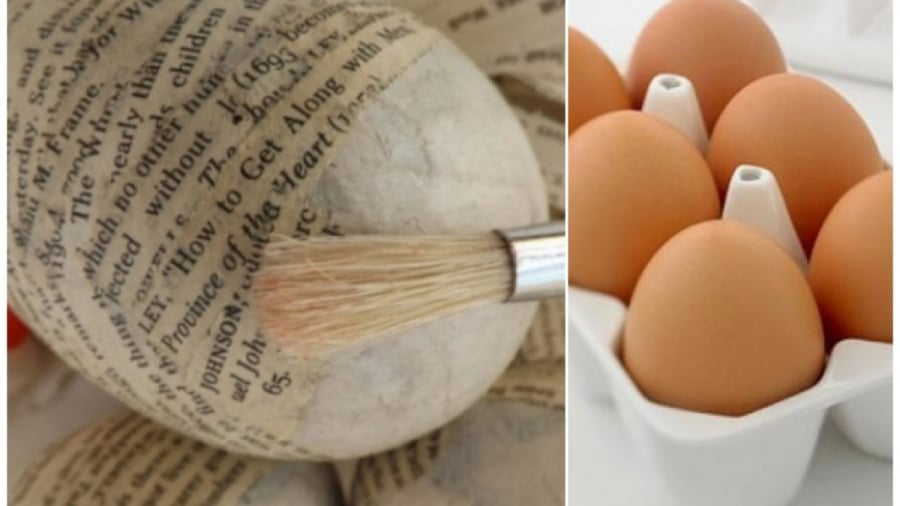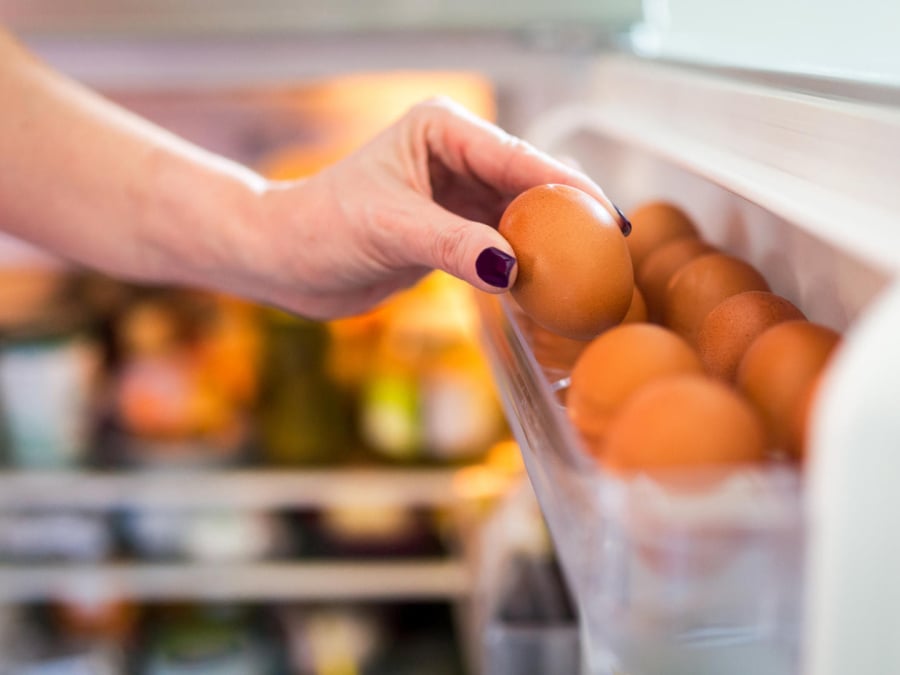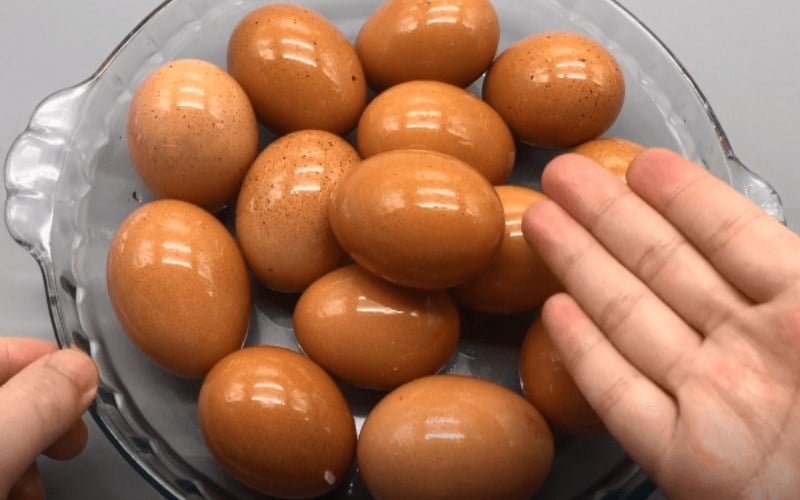How to Store Fresh Eggs for Extended Periods – No Refrigeration Required
Eggs are a nutritious and cost-effective food that can be stored for a long time, so many people keep them at home. In addition to keeping eggs in the refrigerator, there are many easy and long-lasting ways to preserve eggs that have not been used up. You can refer to the methods of preserving eggs for a long time and identifying spoiled eggs from smart housewives.
Preserving eggs with bran or sawdust
Dried bran and sawdust can help preserve chicken eggs or duck eggs for up to several months with a very simple method.
You just need to put a layer of bran or sawdust in a foam box, place the eggs in it, and continue to sprinkle bran/sawdust until the eggs are completely covered. You can do this alternately until all the eggs are finished, then cover tightly and place the box in a cool place and use gradually.
Coating eggs with cooking oil

A simple way to preserve eggs is to coat the eggshells with a thin layer of vegetable oil like sesame oil, coconut oil, soybean oil, etc. However, this method is more effective if you keep the eggs at a temperature of 25 – 32 degrees Celsius and use them within one month.
Place eggs in tea waste
If you don’t have bran or sawdust at home, you can use a more readily available ingredient, which is tea waste. With the same method as using bran or sawdust above, you can easily store eggs for up to 2 – 3 months using tea waste.
Wrap eggs in newspaper
When preserving eggs in newspaper, you should clean the surface of the eggs with a damp paper towel and wrap the eggs gently in the newspaper. Then, place them in a dry, well-ventilated place. Alternatively, you can place the eggs wrapped in newspaper in the refrigerator.
Preserving eggs in the refrigerator

Preserving eggs in the refrigerator is always a convenient and quick method chosen by housewives. However, to preserve eggs in the best way, you should follow the following guidelines:
+ Clean the eggs before preservation
To remove any dirt that may harbor bacteria, before putting the eggs in the refrigerator, you should clean the eggs with a soft, damp towel to clean the eggshells.
+ Keep the larger end facing up
When placing the eggs on the tray, you should turn the smaller end down, so that the larger end is facing up, as it will help the egg yolk not float and make it easier to use the eggs for a longer period.
+ Use specialized trays
To easily preserve eggs, you place the clean eggs, with the tips facing up, in a carton, a food storage box, or specialized containers, and place them in the refrigerator’s cool compartment.
+ Do not store eggs on the refrigerator door
The refrigerator door is a position that is constantly subjected to temperature changes, which will make the eggs spoil quickly. You should place the eggs deep inside the refrigerator or in food storage compartments.
+ Eggs can only be preserved in the refrigerator from the moment you put them in the refrigerator for 3 – 5 weeks. Note the time to avoid using eggs that have been stored for too long!
+ If the eggs have been stored in the refrigerator, you should not take them out and leave them in the external environment for a long time, then put them back in the refrigerator. This will cause the eggs to spoil faster because the water droplets from evaporation on the eggshells will seep in and make the eggs deteriorate.
How to identify spoiled eggs

The maximum time to preserve eggs in the refrigerator is from 3 – 5 weeks. When taking the eggs out of the refrigerator, you should use them within 2 hours to avoid spoiling the eggs.
To check if an egg is spoiled or not, prepare a cup of cold water, put the egg in the cup, and observe:
– Fresh egg: the egg sinks and lies flat on the bottom of the cup.
– Slightly old egg (1 week): the egg lies at the bottom and slightly floats on the water surface.
– Old egg (3 weeks): the egg balances with the pointed end pointing downwards and the larger end pointing upwards.
– Spoiled egg: the egg floats completely on the water surface.
The post https://meo.tips/featured/how-to-store-fresh-eggs-for-extended-periods-no-refrigeration-required/ appeared first on Meo.tips.
View more from Meo.tips:
25+ Funny and Hilarious Poems to Celebrate Your Best Friend’s BirthdayAvoiding and Resolving Hair Loss in Dogs: Understand the Causes and Find Solutions
Announcement of 2023 Grade 10 Admission Timeline for 63 Provinces and Cities
Unlocking Strategies for Winning the Comet Race Board Game from Experienced Classroom Code Talkers
“Most Popular Board Games for a Group of Four Players”
“A Comprehensive Guide to Playing Codenames”
“Unforeseen Results of Fertilizing Plants with Tofu”
Choosing Nutritious and Safe Sugars to Promote Health
Tips for Selecting and Preparing Bitter Melon
“Essential Tips for Sealing and Removing Scratches on Wooden Furniture”
“How to Quickly Re-Issue Your Health Insurance Card from Home”
Finding the Perfect Suitcase: Experience the Simplicity and Quality of a Well-Suited Bag
Discover the Best 12 Homestays in Can Tho with Affordable Rates and Stylish Interiors with Natural Views
Stunning View from Top Homestay in Buon Ma Thuot Gaining Popularity Amid COVID-19
Suggested Hot Beaches for an Unforgettable Holiday Getaway April 30 – May 1
Explore the Top 10 Spectacular Da Nang Homestays with Amazing Ocean Views and Prime Locations
“How to Avoid Common Mistakes while Charging Your Phone Battery”
10 Tips to Create Stunning Photos with an iPhone: What You Need to Know
Guide to Changing Mouse Pointer Icon on Windows 10
Learn How to Verify iPhone/iPad IMEI and Check Warranty Status
Comments
Post a Comment